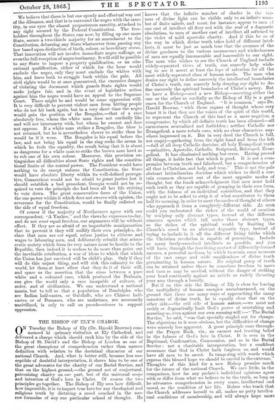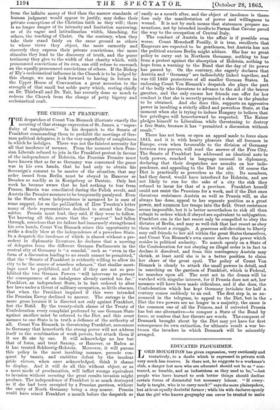THE BISHOP OF ELY'S CHARGE.
IAN Tuesday the Bishop of Ely (Dr. Harold Browne) com-
menced menced hi ;primary visitation at Ely Cathedral, and delivered a charge which should rank him by the side of the Bishop of St. David's and the Bishop of London as one of the great champions of comprehension rather than narrow definition with relation to the doctrinal character of our national Church. And, what is better still, because less sus- ceptible of doubtful interpretation, it shows him to be one of the great advocates for the charity of our Burial Service, and that on the highest ground,—the ground not of conjectural, patronizing charity on our part, but of the universal scope and intention of God's love in Christ. Of course the two principles go together. The Bishop of Ely sees how difficult, how impossible, it is to impart true love for any theological and religious truth by dictating a creed couched in the nar- row formulas of any one particular school of thought. He knows that the infinite number of shades in the ful- ness of divine light can be visible only to an infinite num- ber of finite minds, and must, for instance, appear to men of one cast of intellect all fiery red with the zeal of a dogmatic absolutism, to men of another cast of intellect all softened to the violet of mild apostolic charity. And if this be so of the way in which divine truth takes hold of different intel-
lects, it must be just as much true that the avenues of the divine goodness to the various meannesses and wickednesses of men are equally innumerable and inacessible to our sight. The man who wishes to see the Church of England include widely-separated views of truth, can scarcely help wish- ing to see it assert at least the hope of salvation for all the most widely-separated class of human needs. The man who denies our right to define narrowly the intellectual boundaries of Christ's truth, can scarcely help denying our right to de- fine narrowly the spiritual boundaries of Christ's mercy. But to have a Bishop—and a new Bishop—asserting either the one or the other so cordially as the Bishop of Ely is a good omen for the Church of England. "It is common," says Dr. Harold Browne, "with those organs of thought whose very boast it is that they are the voices of the spirit of this world, to represent the Church of this land as a mere negation, a compromise, by which all definite truth has been silenced—all earnestness neutralized and forbidden ; neither Catholic nor • Evangelical, a mere tabula rasa, with no clear characters any- where impressed on it. But in very deed the Church is full, not empty—gathering from the right hand and from the left —full of all deep Catholic doctrine, all holy Evangelical truth —primitive, Apostolic, Catholic, Scriptural, Reformed, Evan- gelical. It has eliminated nothing but error. Having proved all things, it holds fast that which is good. It is not a com- promise between truth and falsehood, but a comprehension of all that is Christian, and holy, and true." This is not the pale abstract latitudinarian doctrine which wishes to distil a cer- tain common element out of the most opposite modes of thought, but the frank acknowledgment that men must hold. such truth as they are capable of grasping in their own form, with the fulness of an individual conviction, and that they ought not to be asked to strip it of what constitutes to them half its meaning, in order to meet the modes of thought of others who approach it from a completely-different side, As soon could you understand the riches of the world of creation by studying only abstract types, instead of the different concrete species which fall under -those abstract types, as the riches of the spiritual world by limiting the Church's creed to an abstract dogmatic type, instead of trying to include in it all the different living faiths which the Christian revelation is capable of generating. Include as many freely-exercised intellects as possible, and you will have, through the free living contact of differently-formed natures, a powerful medium, by which to attain some measure of the vast range and wide ramifications of divine truth germinating in human nature. No original grasp of truth can be attained unless there be conscious freedom to move and turn as may be needful, without the danger of striking your head continually against an article or rudely thrusting your arm through a homily.
But if on this side the Bishop of Ely is clear for leaving the multiplicity of human energies unembarrassed, on the ground that there are many ways of approaching the many mansions of divine truth, he is equally clear that on the other side,—the evil side of human nature,—we must not rashly or dogmatically limit God's power of overtaking and. arresting us, even against our own seeming will :—" The Burial Service," he said, "was that specially singled out for change.
The objections to it were obvious, but the difficulties of change were scarcely less apparent. A great principle runs through- out the Prayer Book, viz., an earnest and trusting belief
in the fulness of God's love in Christ. It is seen in the
Baptismal, Confirmation, Communion, and so in the Burial Service : not a charitable interpretation, but a confident assurance that God in Christ hath forgiven us, and would have all men to be saved. In tampering with words which express this blessed hope we should be careful in the extreme." Thoughts of this ,kind for a new Bishop promise much for the future of the national Church. We care little, in the comparison, how far any prelate's individual opinions agree
with or differ from what we believe to be the truth, so long as he advocates comprehension in every sense, intellectual and moral, as the condition of her life. Rulers who teach that the Church addresses herself to all, makes no petty intellee tual conditions of membership, and will always hope more
from the infinite mercy of God than the narrow standards of easily as a month after, and the object of insolence is there- fore only the manifestation of power and willingness to wound. It is not by such means that statesmen prepare an- nexations, not by intended insults to Parma that Cavour paved the way to the occupation of Central Italy. human judgment would appear to justify, may define their private conceptions of the Christian faith as they will ; there is no longer danger of its intensity and limitation narrowing, or of its vague and latitudinarian width, blanching, for others, the teaching of Christ. On the contrary, when they take their stand fairly on the same ground as others to whose views they object, the more earnestly and sincerely they express their private convictions, the more stimulus they lend to the discovery of truth, and the purer testimony they give to the width of that charity which, with pronounced convictions of its Own, can still refuse to encroach on the equally pronounced convictions of others. If the Bishop of Ely's ecclesiastical influence in the Church is to be judged by this charge, we may look forward to having in future in the Upper House of Convocation a great accession to the strength of that small but noble party which, resting chiefly on Dr. Thirlwall and Dr. Tait, has recently done so much to redeem the Church from the charge of petty bigotry and ecclesiastical craft.































 Previous page
Previous page